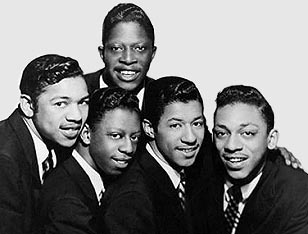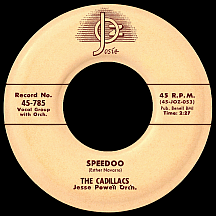THE CADILLACS
Speedoo
The quintet called The Cadillacs had more members during its existence than just about any vocal group from rock's early years, the exception being The Drifters, who may hold a record with at least four dozen vocalists possessing (in some cases transitory) Drifters credentials. But it doesn't really matter how many there were, as just one man's contribution was crucial to the admittedly off-and-on success of said Cadillacs. He was Earl Carroll, identified by this famous lyric: 'They often call me Speedoo but my real name is Mister Earl!'
Actually, Earl's harmony ensemble started in 1953 as The Carnations, inspired by Sonny Til's group The Orioles (hot at the time with "Crying in the Chapel") and a number of favorite gospel acts. Hailing from Harlem, they rose to a professional level fairly quickly after auditioning for Lover Patterson (later manager of The Five Crowns, the act featuring Ben E. King that became the aforementioned Drifters when a rarely-seen sweeping overhaul occurred in 1958). Patterson introduced them to songwriter Esther Navarro, who became the group's manager. Looking sharp in matching suits, each member wore a white carnation in the lapel of his jacket; the image was keen and their vocal harmonies were polished. The stage routines needed work, but Esther had ideas about that. Upon realizing a Carnations group already existed, they decided on the Cadillacs as a moniker, setting off a trend of vocal groups taking car names (shortly thereafter, a Chicago sextet emerged with a more specific Cadillac-related name, The El Dorados).
Navarro negotiated a contract for them with former big band singer Jerry Blaine's newly-minted Josie Records (a subsidiary of Jubilee, boasting the Orioles among its roster) and they made a minor impact in New York and a few other east coast cities with their first single, the haunting "Gloria," in the summer of '54. Esther claimed writer credit for the song, though it was actually penned by Exclusive Records owner Leon Rene around 1945 and first recorded in '46 by bandleader Buddy Baker (with vocalist Bob Hayward). More versions followed in the '40s by Johnny Moore's Three Blazers (with Charles Brown) and bandleader Ray Anthony, in addition to a top 20 hit version by The Mills Brothers in late 1948. Navarro simplified the lyrics and the Cadillacs (backed by Rene Hall's band) delivered, quite simply, one of the quintessential vocal group performances ('It's not Marie-ee-it's...Gloria...'), the ode to romance by which other street corner ballads are measured (many artists emulated the Caddies and were likely unaware of the earlier renditions; of these, The Passions' 1960 recording on Audicon probably came closest to the allure of the Cadillacs' classic). The song has achieved legendary status in the annals of doo wop.
The breakthrough, though, was still more than a year away, coming finally with the fifth release. The original Carnations had been lead singer Carroll with tenors Laverne Drake and James "Poppa" Clark, bass singer Gus Willingham and baritone-turned-bass Bobby Phillips. By the time that fifth Cadillacs disc was waxed (with orchestra leader Jesse Powell, who made several instrumental records for Josie), Clark and Willingham had been replaced by Earl Wade and Charles "Buddy" Brooks. Carroll (or perhaps Navarro, who took label credit) wrote "Speedoo" (pronounced "Speed-O") based on a nickname he'd had since childhood (others claimed the name was "Speedy" because he moved slowly). At any rate, Mr. Earl boasted about '...takin' other folks's girls' while confusing the nickname issue a bit in an attempt to make his point: 'Well now some may call me Moe, some may call me Joe...just remember Speed-O, he don't never take it slow!' The infectious uptempo tune set the New York airwaves afire in the fall of 1955, thanks in part to Alan Freed playing it heavily on WINS. By February of '56 it was a national hit, top 20 pop and number three rhythm and blues.

The follow-up single, "Zoom," cemented the quintet's energetic image and stands as one of their best efforts. Stage routines had become increasingly theatrical under the direction of seasoned choreographer Cholly Atkins as they gradually developed into a comedic act along the lines of not-yet major stars The Coasters, a far cry from the ballad sound that had established them. But emotions ran high with these guys and the departure of original Carnation Lavern Drake signaled a split between members resulting in two separate groups and several new singers. "Speedoo" Carroll fronted The Original Cadillacs while new recruit Bobby Spencer (a singer-songwriter who had written "My Boy Lollipop" with Johnny Roberts, first recorded by Barbie Gaye in '56 and a worldwide hit eight years later for Jamaican Millie Small) became the leader of the outfit that retained the actual name. Jimmy "J.R." Bailey (Drake's replacement) bounced back and forth between both groups. Inconsistencies ensued; the impressive cover shot of the album The Fabulous Cadillacs has only four group members shown cruising the City in a white Caddy. Both acts recorded for Josie (two 1957 singles credited the Original Cadillacs) and Navarro took advantage of the unique situation, booking each on separate tours, easily meeting a demand created by "Speedoo" that might have put just one group in a crunch.
With only a small late-'56 seasonal hit, "Rudolph the Red-Nosed Reindeer," over a two-year span, the divided factions became one again in early 1958 (necessitating the departure of several singers), Carroll taking less of a lead role as recordings became more group-centric. "Speedoo is Back" was an unsuccessful attempt at exploiting their signature hit (to its credit, the track bears little resemblance to "Speedoo"). The Coasters were riding high by that time and the Caddies began to inject more humor into their music. "Peek-A-Boo" ('...I'm watching you!'), written by Jack Hammer (an alias for Earl Burroughs), bore more than a casual similarity to "Yakety Yak" ('...don't talk back!'), though with a Halloweenish scream or two, and the gimmick worked; the record was a hit, returning the Cadillacs to the top 30 in January '59. The group's penchant for comedy found its way to celluloid in Go, Johnny, Go! starring Freed, which hit theaters that year. They performed two songs in the film: "Jay Walker" and "Please, Mr. Johnson" (...'uh-uh, no more!'), the latter a song they're well remembered for despite the single's no-show on trade magazine charts.
Miffed by his relegation to "regular" member, Carroll pulled out around that time and had one single on Josie, "Naggity Nag," with a new backing group, crediting the act as Speedo with the Pearls (adopting a shorter spelling of his nickname to avoid mispronunciation). The remaining Cadillacs had another chart entry that year with "Romeo," a song less gimmicky but owing much of its structure to their signature tune. Over the next few years the Cadillacs, led by Bobby Spencer for much of this period, had records released on Smash ("What You Bet," the group's final R&B chart single in September '61), Capitol, Lana, Navarro's own label, Arctic (not affiliated with the same-named Philadelphia-based label), and others I've no doubt missed. At one point J.R. Bailey, Bobby Phillips and Charles Brooks all sang with hit N.Y. group The Jive Five.
Earl "Speedoo" Carroll joined the Coasters around 1961 (after their impressive run of Leiber-Stoller-produced hits had essentially wrapped), a logical move considering his experience with silly musical shenanigans, a Coasters trademark. He and Bobby Phillips revived The Cadillacs several years later, performing regularly with varying singers (occasionally including a few former members), staying at it for more than two decades. Bobby Spencer worked as a session singer later in the '60s and provided the lead vocals for Crazy Elephant's 1969 hit "Gimme Gimme Good Lovin'," a very un-Cadillacs-like song.


